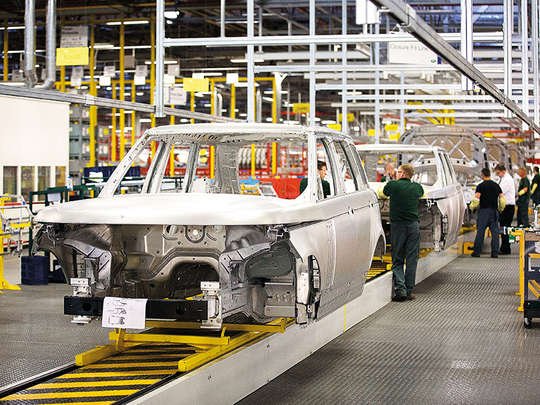
London: Iconic British carmaker Jaguar Land Rover warned Thursday that a “bad” Brexit deal could jeopardise planned investment of more than $100 billion (Dh367 billion), upping corporate pressure as the government heads into crucial talks.
The news comes after major European manufacturers Airbus, BMW and Siemens also warned in recent weeks that Brexit could mean their pulling investment out of Britain, imperilling many thousands of jobs.
The chief executive of the British-based auto group, which is owned by India’s Tata Motors, said its “heart and soul was in the UK”.
“However, we, and our partners in the supply chain, face an unpredictable future if the Brexit negotiations do not maintain free and frictionless trade with the EU and unrestricted access to the single market,” CEO Ralf Speth said.
“We urgently need greater certainty to continue to invest heavily in the UK and safeguard our suppliers, customers and 40,000 British-based employees.”
Prime Minister Theresa May will on Friday hold a summit of her divided cabinet to thrash out their differences on how close economically Britain should stay to the European Union after Brexit takes effect in March 2019.
In response to the warning, the leader of Britain’s biggest trade union accused ministers of playing “Russian roulette” with tens of thousands of jobs, but Business Secretary Greg Clark said the government was determined to ensure JLR can continue to invest.
Speth said a “bad Brexit” deal that reimposes barriers between Britain and its biggest trading partners “would cost Jaguar Land Rover more than £1.2 billion [$1.6 billion, €1.3 billion] profit each year”.
Extremist views
“As a result, we would have to drastically adjust our spending profile,” he warned, noting that JLR plans to invest #80 billion in the next five years.
“This would be in jeopardy should we be faced with the wrong outcome.”
The British Chambers of Commerce, which represents thousands of firms, had already warned this week that business patience is at “breaking point” over the government’s lack of progress in stalled Brexit talks.
Clark, who has urged his warring cabinet colleagues to take business concerns seriously, called JLR a “great British success story”.
“We are determined to make sure that it can continue to prosper and to invest in Britain,” he tweeted.
JLR revealed last month that it would switch some production of its Land Rover Discovery model to Slovakia, potentially reducing the number of temporary workers.
In 2017 the company sold 621,000 cars, with 80 per cent of them heading overseas. One in three cars exported from Britain are Jaguars or Land Rovers, and mainland Europe is one of the company’s largest markets.
After the warning from Speth, Unite trade union general secretary Len McCluskey said the government was indulging “narrow, extremist views” above the future of manufacturing jobs.
“So I say this to the Tory [Conservative] party, our jobs are not yours to play Russian roulette with,” he said.
“Drop your red lines and secure a decent deal, one that is to the benefit of the working people of this country.”
Factbox: Britain’s May to propose new customs plan to divided government
Prime Minister Theresa May will propose on Friday a new plan to ease trade and offer Britain more freedom to set tariffs after Brexit, a last-ditch attempt to unite her divided government on plans to leave the European Union.
Her Downing Street office said May will unveil the plan — the “facilitated customs arrangement” — to her team of ministers at her country residence Chequers on Friday, trying to secure an agreement to push on with all-but-stalled Brexit talks.
May is under increasing pressure from EU officials, companies and some lawmakers to move forward with negotiations to leave the EU, a departure that will mark Britain’s biggest trading and foreign policy shift in almost half a century.
The new plan will see Britain closely mirror EU rules, use technology to determine where goods will end up and therefore which tariffs should be applied, and hand Britain the freedom to set its own tariffs on goods.
— Reuters












